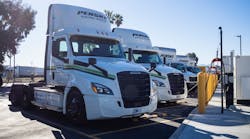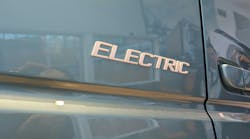The electrification of the nation’s vehicles will require a great deal of energy, and long-haul trucking would consume more than 10% of the electricity generated in the country today. At least that is one of the findings of a new report from the American Transportation Research Institute (ATRI). The report also found that “an all-electric U.S. vehicle fleet would use more than 40% of the energy generated—and some states would need to generate as much as 60% more electricity than they do today.
I agree. It is going to take a lot of electricity to move into a zero-emission freight transportation future. However, we are not talking about needing all that additional electricity tomorrow, next month, year, or even decade. The transformation to zero-emissions trucking is going to take place over three decades. We will have time to make the changes needed to meet this new energy demand. However, we cannot wait to begin to address this need.
Another thing to remember is that the long-haul segment of the trucking industry is looking for other alternatives to electric power—hydrogen being one of them. Even though green hydrogen takes a lot of electricity to produce, it can be made at a single location and then trucked to stations where trucks can access it.
See also: Report pinpoints top challenges for widespread battery-electric vehicle adoption
The ATRI report said, “Charging the nation’s long-haul truck fleet will prove challenging, partially due to the ongoing truck parking crisis. Current technology will necessitate more chargers than there are truck parking spaces in the U.S., with hardware and installation costs of $112,000 per unit, or more than $35 billion system-wide.” Dealing with the parking issue is one part of the problem we will have to address.
The trucking industry has faced challenges in the past, and it has risen to overcome those challenges. I have faith that the challenge of electrifying the nation’s fleet to reduce carbon emissions is one we will successfully address. It will take all of us working together beginning right now. Utilities especially need to understand the exact needs of the trucking industry for electricity and begin work on expanding the grid to meet those needs.
It is clear to me, that the trucking industry is committed to a cleaner future. Now we just need to begin the hard work and “get ‘er done.”
Michael Roeth has worked in the commercial vehicle industry for nearly 30 years, most recently as executive director of the North American Council for Freight Efficiency (NACFE). He serves on the second National Academy of Sciences Committee on Technologies and Approaches for Reducing the Fuel Consumption of Medium and Heavy-Duty Vehicles and has held various positions in engineering, quality, sales, and plant management with Navistar and Behr/Cummins.



